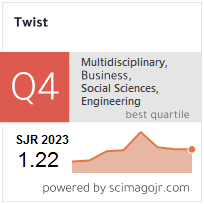Strategy and Availability of Stakeholder on Community Empowerment in Decentralization Waste Management in Makassar
Keywords:
Participation, Stakeholders, Waste Bank, Waste ManagementAbstract
Waste management in Makassar City remains a critical issue as the city seeks global recognition. In 2021, the National Garbage Management Information System (SIPSN) reported that Makassar generated approximately 102,371 tons of waste daily, an anticipated 2.7% increase in 2022. The waste was primarily food waste (58.4%), followed by plastic (21.5%), paper (8.3%), and miscellaneous materials such as cloth, metal, and glass (11.7%). To address this issue, the Makassar City Government introduced waste banks for decentralized waste management. However, challenges persist, such as insufficient stakeholder engagement in policymaking, the absence of a comprehensive long-term waste management plan, inadequate training for officials, and poor coordination among stakeholders. To solve these challenges, we examined the motivations and strategies of stakeholders in Makassar's waste management program, focusing on trash banks to identify deficiencies in the decentralized system. This study investigated the roles of stakeholders using a qualitative phenomenological approach at two waste banks, Baji Pamai and Albur I, in Karawisi and Bitoa. Interviews with 20 informants, including government officials, program facilitators, local leaders, waste bank managers, and customers, revealed significant effects on stakeholder engagement. The findings emphasize the need for a step-by-step process, starting with local leader involvement and additional methods to enhance community participation. Stakeholder strategies have successfully promoted waste banks and improved community involvement and waste management efficiency in Makassar.
Downloads
Downloads
Published
Issue
Section
License
Copyright (c) 2024 TWIST

This work is licensed under a Creative Commons Attribution-NonCommercial-ShareAlike 4.0 International License.











